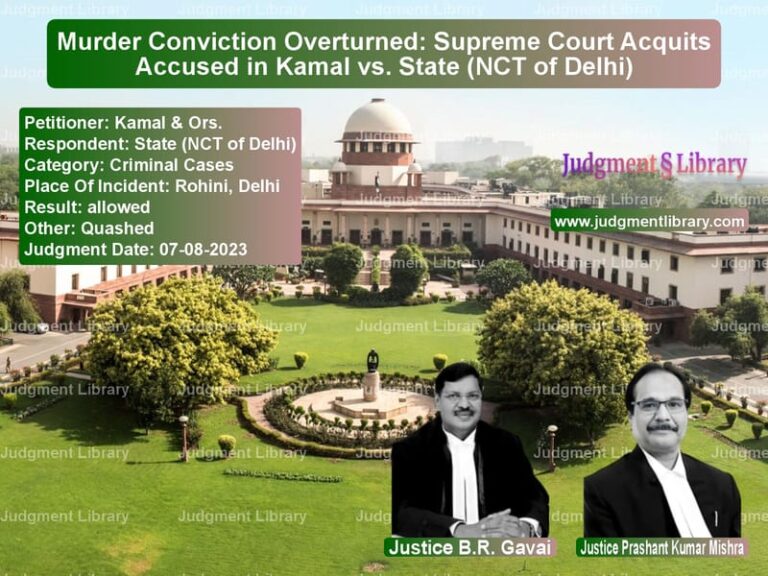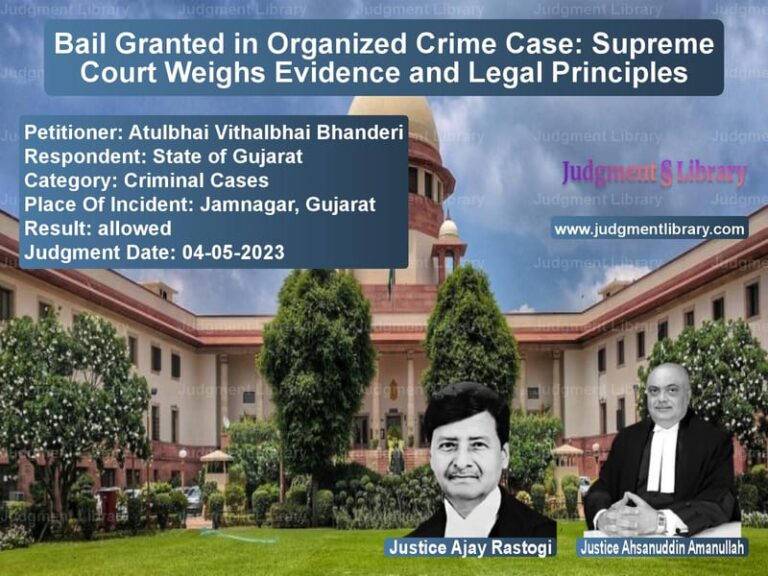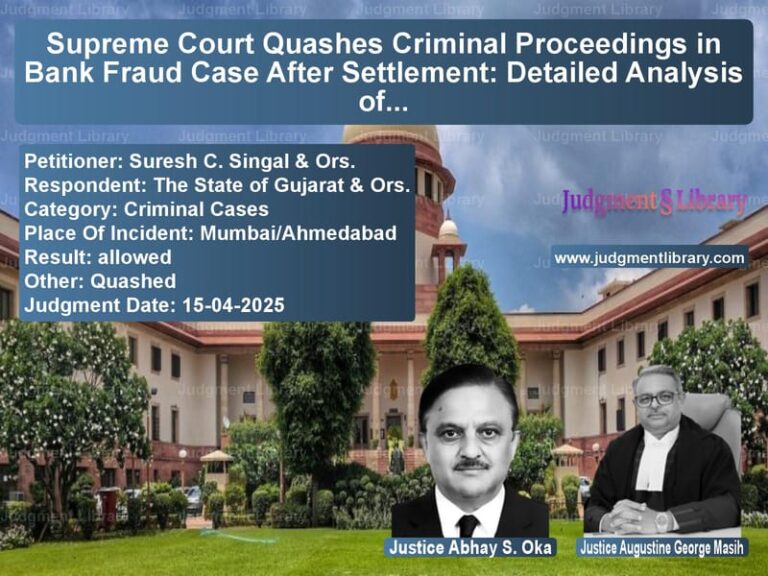Supreme Court Allows Amendment and Impleadment in Mortgage Dispute
The case of Kamlesh Gupta v. Mangat Rai & Anr. revolved around a mortgage dispute concerning a shop property. The primary legal issue was whether the plaintiff, who sought possession of the mortgaged shop, could amend the plaint and implead an additional party after the commencement of trial. The Supreme Court ultimately ruled in favor of the plaintiff, allowing the amendment and impleadment to ensure complete adjudication of the matter.
This ruling clarifies the application of Order VI Rule 17 and Order I Rule 10 of the Civil Procedure Code, 1908 (CPC), particularly regarding amendments and impleadment after the commencement of trial.
Background and Key Issues
The dispute arose from a mortgage transaction concerning a shop located in Punjab. The appellant, Kamlesh Gupta, mortgaged the shop (MC No. B-22/56) to Mangat Rai for Rs. 7 lakhs via a mortgage deed dated September 22, 2009. Later, Gupta filed a suit for possession of the shop by way of redemption upon repayment of the mortgage amount.
The key legal questions before the Supreme Court were:
- Whether the plaintiff could amend the plaint and implead a third party after the commencement of trial?
- Did the High Court err in dismissing the amendment application by relying solely on the proviso to Order VI Rule 17 CPC?
- Would non-impleadment of the new party affect the execution of the final decree?
Arguments of the Petitioner (Kamlesh Gupta)
- The plaintiff sought to implead one Pawan Kumar, whom the second defendant claimed was in possession of the shop.
- New facts emerged during proceedings, indicating that Pawan Kumar was the father of the second defendant and was in possession of the shop.
- The amendment was necessary to avoid future litigation at the execution stage.
- The rejection of the amendment application would result in an incomplete adjudication, as the person in possession would not be bound by the final decree.
Arguments of the Respondents (Mangat Rai & Anr.)
- The facts sought to be added by amendment were already within the plaintiff’s knowledge at the time of filing the suit.
- The application was barred by the proviso to Order VI Rule 17, which prohibits amendments after the commencement of trial unless due diligence is shown.
- The amendment would cause unnecessary delay and complicate the proceedings.
- Pawan Kumar had no independent claim to the shop, and his impleadment was unnecessary.
Supreme Court’s Key Observations
1. The Need for Complete Adjudication
“The fact that Pawan Kumar is now in possession, though unauthorized, has not been disputed by any of the parties. In the present scenario, therefore, even if a decree is granted in favor of the plaintiff, Pawan Kumar may object to the execution of the said decree on the ground that he was not made a party to the suit despite being in possession of the suit shop.”
The Court found that Pawan Kumar’s presence was essential to ensure effective enforcement of the final decree.
2. Proviso to Order VI Rule 17 Not a Rigid Bar
“Undoubtedly, in the present case, the trial has commenced, and the affidavits in lieu of examination-in-chief of four witnesses for the plaintiff have been filed. However, having regard to the fact that the two defendants and Pawan Kumar are close relatives, it seems possible that the plaintiff may have been kept in the dark regarding the possession of the suit shop.”
The Court held that even though the trial had commenced, the amendment should be allowed in the interest of justice, as the plaintiff could not have discovered this information earlier.
3. Ensuring No Future Litigation
“The interest of justice demands that the application be allowed, to ensure that in the eventuality of the suit being decreed in his favor, the plaintiff does not become vulnerable to another round of litigation at the stage of execution.”
The Court emphasized that allowing the amendment would prevent unnecessary execution-stage disputes.
Final Judgment
The Supreme Court allowed the appeal and ruled that:
- The application for amendment and impleadment was valid and necessary.
- The orders of the Trial Court and the High Court rejecting the application were set aside.
- The plaintiff must deposit costs of Rs. 10,000 before the Trial Court within eight weeks.
- The Trial Court must decide the case on merits without being influenced by the Supreme Court’s observations.
Impact of the Judgment
- Clarifies the Scope of Order VI Rule 17 CPC: Prohibits arbitrary rejection of amendment applications if they are necessary for complete adjudication.
- Ensures Fairness in Litigation: Guarantees that all necessary parties are included to prevent execution-stage disputes.
- Prevents Multiplicity of Proceedings: Avoids fresh litigation at the enforcement stage by allowing timely amendments.
- Limits Judicial Discretion in Amendment Cases: Establishes that trial courts must consider practical implications of non-impleadment.
The Supreme Court’s decision ensures that courts adopt a pragmatic approach to amendments and impleadment, balancing procedural rules with the demands of justice.
Petitioner Name: Kamlesh Gupta.Respondent Name: Mangat Rai & Anr..Judgment By: Justice Mohan M. Shantanagoudar, Justice Indira Banerjee.Place Of Incident: Punjab.Judgment Date: 23-09-2019.
Don’t miss out on the full details! Download the complete judgment in PDF format below and gain valuable insights instantly!
Download Judgment: Kamlesh Gupta vs Mangat Rai & Anr. Supreme Court of India Judgment Dated 23-09-2019.pdf
Direct Downlaod Judgment: Direct downlaod this Judgment
See all petitions in Contract Disputes
See all petitions in Property Disputes
See all petitions in Judgment by Mohan M. Shantanagoudar
See all petitions in Judgment by Indira Banerjee
See all petitions in allowed
See all petitions in Modified
See all petitions in supreme court of India judgments September 2019
See all petitions in 2019 judgments
See all posts in Civil Cases Category
See all allowed petitions in Civil Cases Category
See all Dismissed petitions in Civil Cases Category
See all partially allowed petitions in Civil Cases Category







